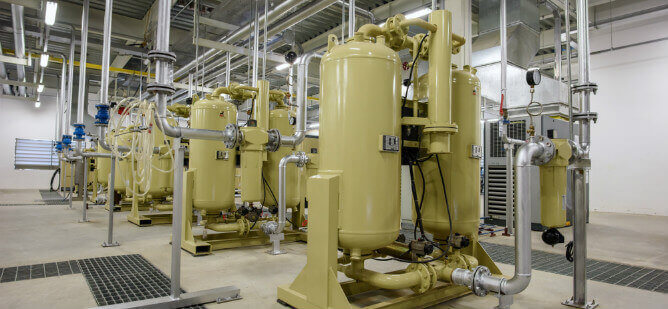
How to Choose the Right Oil for Your Air Compressor
Using the right oil for your air compressor can significantly impact its performance and longevity. In this guide, the experts at NiGen uncover the importance of proper air compressor oil selection.
Different Types of Air Compressor Oils
Air compressor oils come in several varieties with unique properties and applications. The three main types of air compressor oils are:
- Synthetic Compressor Oil: Engineered for high performance, synthetic oils offer excellent lubrication, oxidation resistance, and a wide temperature range. They are suitable for demanding applications and extreme conditions.
- Standard Compressor Oil: Standard or mineral oils are cost-effective and offer moderate performance. They are commonly used in standard compressors operating in less extreme environments.
- Semi-Synthetic Compressor Oil: These oils are a blend of synthetic and mineral oils, offering a balance between performance and cost-effectiveness.
Synthetic vs. Standard Oil for Air Compressors
When choosing the right oil for your air compressor, you’ll likely encounter two main categories: synthetic oil and standard oil (also called mineral oil or traditional oil). Each type has its own set of characteristics, advantages, and disadvantages.
Synthetic Compressor Oil
Advantages:
- High Performance: Synthetic compressor oils are engineered for exceptional performance. They provide superior lubrication, which reduces friction and wear on compressor components, leading to extended air compressor lifespan.
- Resistance to Oxidation: They have excellent resistance to oxidation and thermal breakdown, meaning they maintain their properties for longer periods, resulting in longer oil change intervals.
- Reduced Deposit Formation: Synthetic oils tend to produce fewer deposits and sludges inside the compressor, keeping it cleaner and more efficient.
- Wide Temperature Range: Synthetics perform well in extreme temperatures, whether hot or cold. This makes them suitable for industrial air compressors in various environments.
- Energy Efficiency: Due to reduced friction, synthetic oils can improve energy efficiency, potentially lowering energy costs.
Disadvantages:
- Higher Cost: Synthetic compressor oils generally come at a higher price than traditional oils. However, their extended lifespan and superior performance can offset the initial cost.
- Compatibility Concerns: In some cases, synthetic oils may not be compatible with certain compressor materials or seals. It’s crucial to consult the manufacturer’s recommendations.
Standard Compressor Oil
Advantages:
- Cost-Effective: Mineral compressor oils are typically more budget-friendly, making them a cost-effective choice for some applications.
- Availability: Standard oils are widely available, making them easily accessible for routine air compressor maintenance.
- Compatibility: They are generally compatible with a wide range of compressor materials and seals, reducing the risk of compatibility issues.
Disadvantages:
- Limited Temperature Range: Traditional oils may not perform as well in extreme temperature conditions, potentially leading to issues in very hot or cold environments.
- Shorter Lifespan: They tend to break down and degrade more quickly than synthetic oils, necessitating more frequent oil changes and potentially increasing maintenance costs.
- Deposits and Sludge Formation: Mineral oils can leave deposits and sludges in the compressor, potentially reducing air compressor efficiency and lifespan.
- Less Energy Efficiency: Due to higher friction levels, standard oils may result in slightly lower energy efficiency compared to synthetics.
Choosing the Right Oil
The choice between synthetic and standard compressor oil ultimately depends on your specific compressor type, operating conditions, and budget. Here are some guidelines:
Choose Synthetic Oil When:
- High-performance and extended oil change intervals are crucial.
- Your compressor operates in extreme temperature conditions.
- You’re looking for energy efficiency gains.
- Compatibility with synthetic oil is confirmed by the air compressor manufacturer.
Choose Standard Oil When:
- Budget constraints are a concern.
- Your compressor operates in moderate temperature conditions.
- Compatibility is a primary consideration.
- Frequent oil changes are acceptable.
In many cases, semi-synthetic compressor oils (a blend of synthetic and mineral oils) offer a compromise between cost and performance. Always consult your compressor’s manufacturer recommendations and specifications to make the best choice for your specific compressor and operational needs.

Other Considerations
Viscosity Grades
Viscosity refers to the oil’s thickness or resistance to flow. Compressor oils are categorized by viscosity grades, typically represented by numbers such as ISO 32, ISO 46, or ISO 68.
Viscosity affects how well the oil performs in different temperature conditions. Lower-viscosity oils are better suited for cold environments, while higher-viscosity oils excel in hot conditions.
The right viscosity ensures proper lubrication, reducing friction and minimizing wear on compressor parts.
Compatibility
Choosing compressor oil that is compatible with your compressor’s materials is essential. Incompatibility can lead to corrosion, damage, and costly repairs. Always check the manufacturer’s recommendations to ensure the chosen oil is suitable for your compressor’s construction materials, including seals, gaskets, and metals.
Oil Additives
Compressor oils often contain additives to enhance their performance.
Anti-wear additives reduce friction and wear on compressor parts, extending their lifespan.
Oxidation inhibitors prevent the oil from breaking down due to exposure to air, prolonging its life and maintaining performance.
Environmental Impact
Environmental factors like biodegradability and eco-friendliness may influence your oil choice. Biodegradable compressor oils are available for applications where environmental impact is a concern. Always consider the ecological implications of your choice, especially in environmentally sensitive settings.
Alternatives
Alternatives to traditional air compressor oils include automatic transmission fluid (ATF), hydraulic oil, and motor oil. These alternatives offer different performance characteristics and can be chosen based on factors like temperature, environmental concerns, or industry-specific requirements.
Discover NiGen’s Industrial Air Compressors
Whether you require a high-performance compressor, maintenance services, or expert advice on selecting the right equipment, NiGen has you covered. Don’t compromise on compressed air quality and performance. Explore our industrial air compressor products and experience the difference.
Contact us today to discuss your requirements and take your operations to the next level.
